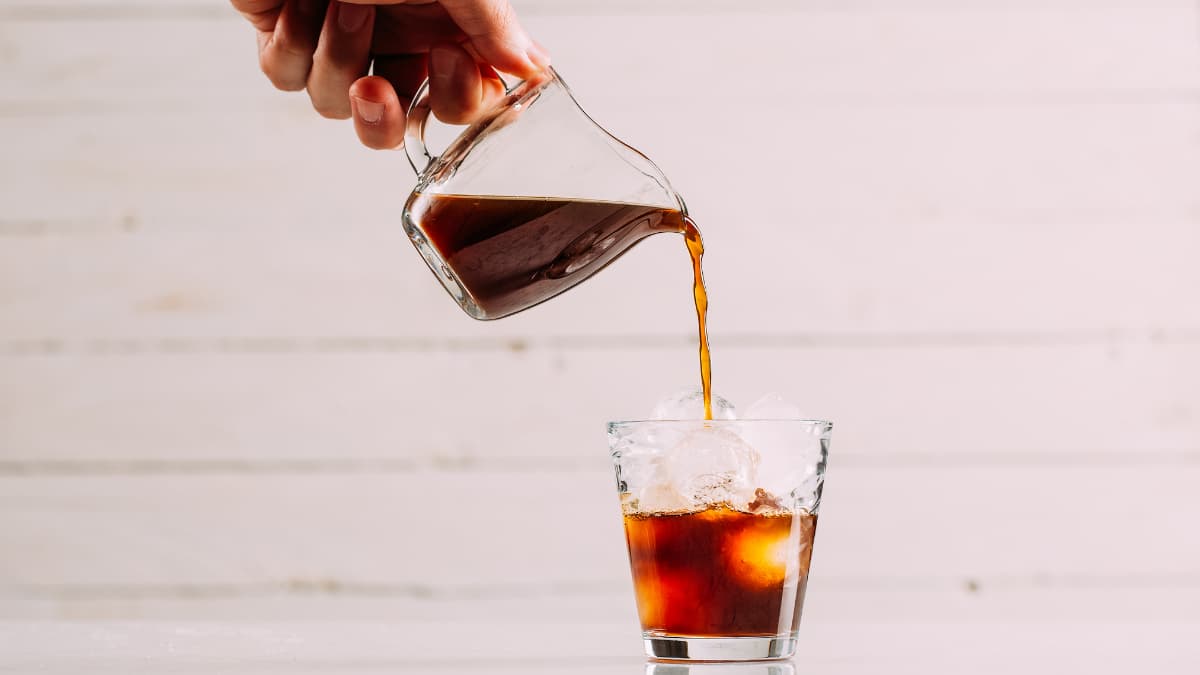Can you heat Cold Brew Coffee?
If you’re into coffee like me, you’ll enjoy experimenting with different brewing methods and tweaking it until you find that perfect cup.
In the summer, my favorite method is probably cold brew. I have fond memories of confusing this with iced coffee when I was younger.
Working as a barista, I’d find myself brewing liters of cold brew concentrate on the daily. Often, customers would ask “can you heat cold brew coffee?“
If you’re after a very quick answer – yes, you can and a hot cold brew cup of coffee is a thing for some! Now, if you’re after the details, keep reading:

Cold Brew Coffee History
With the large influx of cafes serving cold brew coffee on their menu during the past decade, you’d be forgiven for thinking it’s a recent invention. But it’s been around for centuries.
Nonetheless, brand marketing has capitalized on the fact that coffee made this way is usually less acidic than regular brewed coffee beans.
Using room temperature water as a brewing technique was first recorded in Japan in the 1600s. As coffee is not indigenous in Japan, the beverage first used assorted teas. Cold brew coffee was reputedly introduced in the country through Dutch settlers.
It was usually sold as a concentrate and was a way for them to serve large amounts of coffee, which they would later brew using hot water or cold water.
Later variations of the refreshing drink include France’s Mazagran, a form of cold brew made by mixing a sweetened coffee concentrate with cold water. Chicory was also a favored type of additive with widespread use in New Orleans, the UK, and France.
By the 1800s, cold brew coffee served as a staple for soldiers all over the world as it is easily portable and has a long shelf-life. It wasn’t until the 1960s when the modern form of cold brew took shape thanks to the invention of the Toddy.
Nowadays, you can even pick up cold brew concentrate at your supermarket, right next to the regular iced coffee!
Can you warm up Cold Brew Coffee?
The short answer is yes, cold brew coffee can be heated.
But, if you’re in a cafe and ask a barista to use a microwave to heat it up, don’t be surprised by their upside-down smile!
Usually, when a customer would ask for this when I was a barista, I’d question them a little to figure out if they knew the difference between this method and regular brewing. If not, I’d feel the need to get their knowledge up to speed before they raced ahead to murder the ground beans I’d spent yesterday grinding and preparing with cold water.
Nonetheless, there are several methods to heat up cold brew, with some as simple as popping it into the microwave or pouring hot water from your kettle.
But, do I recommend you warm it up? Not really, but there are advantages:
If you’re after a quick cup of hot coffee, you can heat up your cold brew coffee that you prepared the night before. It is also an inexpensive way to make a cup of coffee since you’ll only need a heating source, filters, and your container for the cold brew.
However, some ways to make “hot” cold brew can cause a significant departure in the flavors you might associate with your coffee if you’re not too careful. In general, reheating coffee can accelerate chemical reactions that oxidizes your coffee. This essentially ages your brew and can have detrimental effects on the flavor in the cup.
Nonetheless, with how cold brew coffee works, these effects are less prominent than your regular hot coffee.
Heating cold brew coffee too fast, either by immediately pouring hot water or using high heat on your microwave or stove, can hasten this process, so it’s best to use low heat if you’re going for these steps.

Does heating up Cold Brew Coffee make it acidic?
While cold brew might be less acidic in general vs regular brewed coffee, it still contains acids, and this acidity is retained in the water even after the cold brewing process.
Reheating up your cold brew does not add increased acidity to your coffee, but it can break down and make your cup more astringent and bitter. The compounds that give your coffee its sweetness can easily be lost, resulting in a more concentrated set of unwanted elements in your hot coffee.
But this process is the same for any brewing method. Yes, any!
Just to add, based on my personal experiences, it is the same story for nitrogen-infused cold brew coffee. I find that reheating disrupts the natural flavor even more so than a regular cold brew leading to a harsher taste. So if you’re in a situation where you can use nitrogen, it is best to make a separate batch if you plan to heat up cold brew.
Why heat up Cold Brew Coffee?
Given the factors that we mentioned above, then why should you reheat your cold brew coffee?
Well, it all boils down to your preference.
The body and flavor of a regular cold brew coffee are unique to this method. It has a smoother mouthfeel and finish while the taste is more pronounced compared to other brewing processes. You can also extract more caffeine (depending on your concentrate ratio) per serving compared to your regular cuppa Joe or Iced coffee.
If you’re the type of individual who wants to experience the advantages of a cold brew with the usual stimulating effects of brewed coffee, then you might be a fan of hot cold brew.
Or maybe you just want to try or learn something new?
It can be a good way to taste the differences in how varied temperatures can affect your coffee and its compounds.
Alright, so you still wanna do it? Here’s how I’d suggest going about it:
Heating Cold Brew Coffee
With coffee, there is never a single way to do things. Regardless if you’re talking about roasting, grinding, or brewing.
The same thing applies here. All you’ll need is the ability to follow simple instructions plus a cold brew at hand, and ta da!
Alright…So how do you heat cold brew?
Microwave Cold Brew Coffee
Want something quick for your caffeine fix? The simplest way for hot cold brew is to pop it in the microwave!
Some coffee purists might feel disgusted at the thought of warm cold brew coffee, but hey, if you’re going to heat it up, you’ve already crossed that line.
Usually, it will only take a minute or two to make your coffee hot but try it at the lowest power setting at first to avoid cold brew flavor degradation.
As with anything coffee, experiment with different times for the brew that you prefer, and if it gets too hot, wait or add water in the form of ice cubes along with some more cold brew!
Diluting Cold Brew Concentrate
As with any brewing process, you can change your ground coffee beans and water ratio depending on your taste. However, here you create a cold brew coffee concentrate by using a super tight ratio.
Using a concentrated cold coffee gives you the ability to use ratios (water + cold brew) in your favor and find your perfect cup.
Typically, you’d dilute concentrate using cold water but adding hot water is also a potential way to warm your coffee. In this case, reheating your cold brew coincides with dilution via the hot water, and this way preserves the taste the most in my experience compared to other steps.
You can add any amount of hot water you want from your kettle but make sure not to go overboard; otherwise, you’ll completely dilute the coffee taste. It’s best to experiment and find a good middle ground by starting slowly with adding hot water.
Remember, if you over dilute it with hot water, just add some more concentrated cold brewed coffee to the mix to even it out.
Cold Brewing & Stovetop Reheating
Reheating up cold brew on a stovetop is also a good alternative to warm up your drink, and any vessel would do.
Personally, If I find myself reheating coffee (not often), I’m a fan of this method because it retains the original flavor of your cold brew while giving it a heavier and even silkier body without a perceived higher acidity.
The caveat?
It’s difficult to find the optimal temperature to heat it correctly. You’ll also have to maintain it at low heat to avoid burning through your hot cold brew.
Nonetheless, remember that practice makes perfect, and soon you’ll be enjoying a unique cup of coffee!
Summary
So yeah, if you enjoy the regular coffee taste, try this out when you’ve got some cold brew leftover, and you want to mix it up.
All in all, while coffee is less acidic when extracted via cold water, reheating it might add a spanner into the mix in terms of increased bitterness. If this potential taste disaster doesn’t bother you, then enjoy this alternative method!

